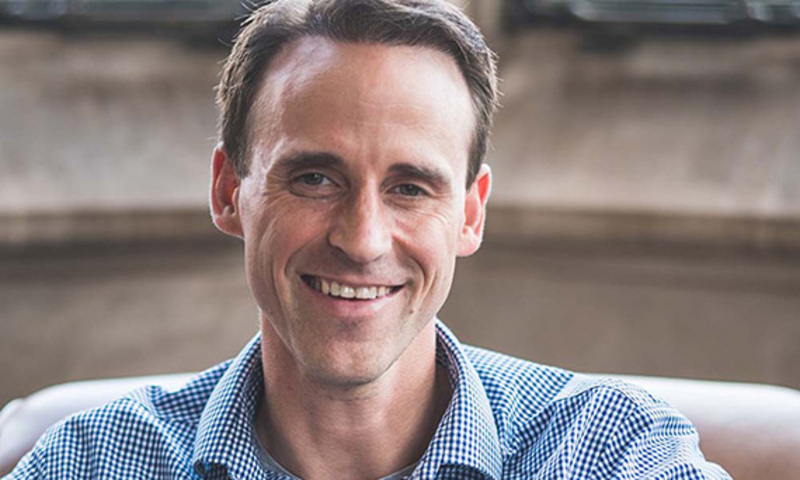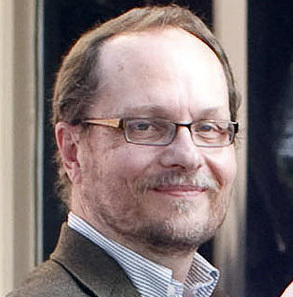Simple Modern could have followed the classic rags-to-riches start-up script: Identify a product people use a lot — let’s say water bottles, travel mugs, tumblers and the like — then zero in on a market for that product, raise capital, make a quality and distinctive product and be smart with your price point. Do all that and you just might become the largest supplier of hydration products to Amazon and Target — and might get picked up as a supplier to WalMart. Your company might even be expected to make $100 million in revenue in 2022.
But what if you reach those heights without following every line of that script? What if you start up with no outside capital? And what if your goal is to give much of your profit away?
That’s the way co-founder of Simple Modern, Mike Beckham, is doing it. Beckham was the guest speaker at Crowell’s Distinguished Speakers event in August.
Doing Business Differently
Beckham co-founded Simple Modern in 2015, with “we exist to give generously” as a mission statement. Each year, the company donates at least 10% of annual profits to charities — 70% of those donations go to nonprofits focused on education, clean water supply, human trafficking and homelessness. The remaining 30% is divided among every employee — about $4,000 each — to give to the charity of their choice.
By the end of 2022, Simple Modern will have given more than $1 million to 45 different nonprofits around the world. They have also invested millions to open a manufacturing plant in Oklahoma, which not only solves supply chain issues but creates more local jobs.
Not having any outside capital had two benefits: It allowed the company to grow exactly as the founders wanted — focused on generosity — and also kept the business plan single-minded.
“We had to be very creative,” said Beckham. “I have this theory that one of the benefits of scarcity is that it helps make you more focused.”
Generosity as a Business Plan
Beckham spent ten years at Cru, and those years in full-time ministry deeply impacted his views on wealth and stewardship.
“The plan is for it to all go away,” he said. “It’s a ridiculous number that I couldn’t spend in a hundred lifetimes. And none of this money will bring me joy and fulfillment.”
Beckham is committed to giving away at least 98% of his personal earnings from Simple Modern. He owns 45% of the company — more than anyone else — but 16 of his employees are co-owners.
“The amount of money that the company is now worth is a really daunting challenge,” Beckham said. “There is no way I can be as good a steward on my own as I can be with a group of people with the same commitment as me. We view Simple Modern through a stewardship lens. The company is not mine, even if on paper I’m the biggest owner. This mindset permeates the entire organization, helps us think long term and hopefully be more selfless.”
Four Principles for Generous Entrepreneurship
1. Explain why your company is different, then act accordingly
“Our mission statement, ‘we exist to give generously,’ is a good starting point,” said Beckham. “But that’s all it is, a start. There is ample opportunity to provide contrast through our actions. For example, we have sourced a lot of products from China, and that can be an opportunity for mission. Our priorities have to be different than other companies when we go to China. We choose to care about them as co-workers, not as resources to be exploited. Business can be extremely transactional, if you let it. We think it should be relational.”
That’s wise business, according to Beckham, but it’s much more than that.
“When you help them understand why you are acting differently (than other companies) you can point them to the gospel,” said Beckham.
That doesn’t make it easy, of course.
“It is messy, being different,” said Beckham. “But being in the business world is usually messy. And we have to remember that we’re not different because we're perfect — we’re different because we have a different perspective and so we respond to the mess differently. We believe in grace and repentance and forgiveness and the power of the cross, and that affects how we respond and gives us an opportunity to be different.
2. Recognize that Christians have a different definition of success than the world does
Beckham finds the world’s standard for success very outcome-based.
“But that can’t be our standard,” Beckham said. “When Jesus says ‘well done my good and faithful servant’ — yes, servant — that’s the highest success possible. So faithfulness in serving is the standard of success, not having a company that makes a bunch of money. And remember, being faithful doesn't necessarily mean that everything will go well!
It’s also important to recognize that the more influence you gain, the less people will want to tell you bad things. That makes it easier to get off track. You have to have people around who will tell you the truth, so that’s something to pray for, too!” he added.
3. Career paths are not linear
“I have found that it is rare that God’s calling will look like a straight line,” said Beckham. “Mine certainly was not. I learned to pray, ‘God, make it clear to me and I will follow you, and if you tell me, I will do it! But please make it clear.’”
4. God calls us to mirror his generosity
“If God is open-handed with us,then we should be open-handed with others,” ” said Beckham, “And that means so much more than writing checks. It’s being holistically open-handed, with our finances but also with our experiences, our wisdom and our time.”
There is growing dissatisfaction in some quarters about the fairness of 21st century capitalism, but Beckham finds the issue isn’t the system as much as the mindset with which it is practiced.
“The problem isn’t capitalism,” said Beckham. “It’s our sinful nature in a capitalist world. That sinfulness in a capitalistic world can lead to a closed-hand viewpoint — this is mine, you can’t have it unless you give me back equal value and then some — but as Christians we know that nothing really belongs to us. Simple Modern isn’t mine — God is letting me be a steward of it, so my accountability is to Him.”
Learn more about developing your own leadership skills with Crowell’s M.A. in Leadership and Innovation, Master of Management, Nonprofit Organizations, or a Bachelor of Science in Business Administration, emphasis in Entrepreneurship.
The Crowell Distinguished Speaker Series brings a selection of accomplished business leaders to campus to share their varied professional and personal insights and provides the opportunity to network with fellow attendees including alumni, MBA mentors, faculty, and current and prospective MBA students. The event is always free and open to all. Future events can be found on the Crowell events calendar.
 Biola University
Biola University


.jpg)
.jpg)
